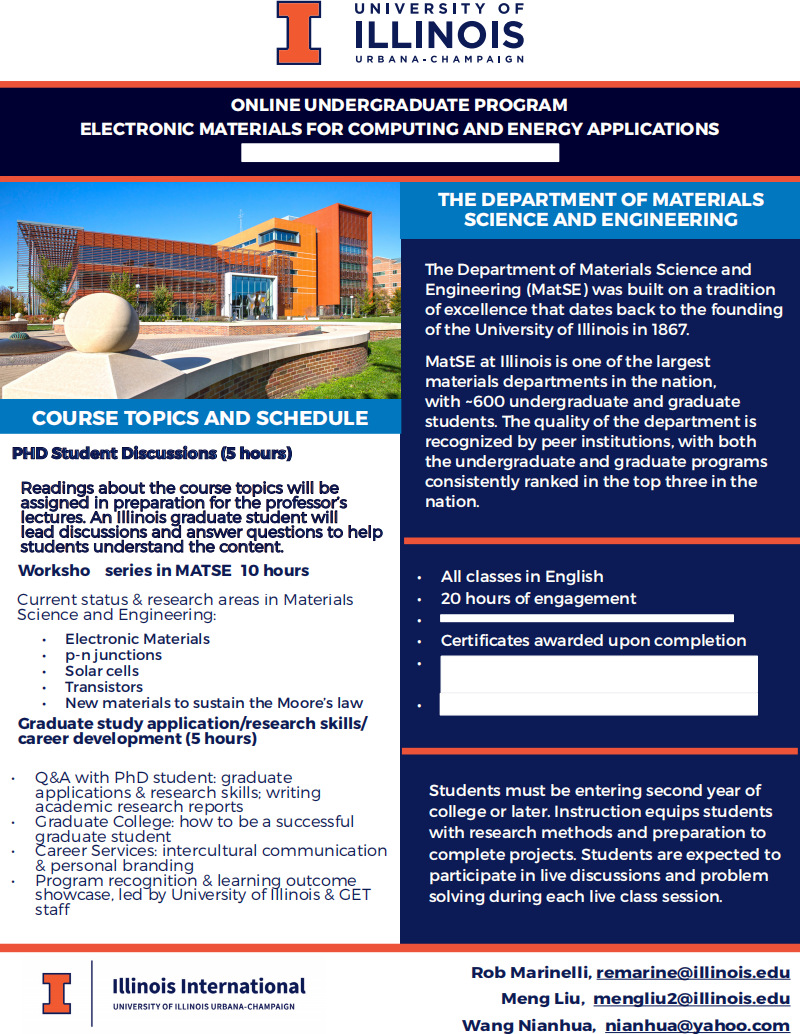为开拓本科生国际视野,学院持续推进与海外一流高校合作,开展多样化的海外交流项目。今年因受全球疫情影响,海外出行暂停。为使本科生仍能体验海外全英文课程,开拓国际学术视野,学院与海外一流高校美国伊利诺伊大学厄巴纳-香槟分校(UIUC)、南洋理工大学(NTU)合作,针对我院开设定制化的暑期线上课程。
伊利诺伊大学厄巴纳-香槟分校(University of Illinois at Urbana-Champaign,缩写为UIUC),创建于1867年,是一所世界著名的公立研究型大学。该校是美国“十大联盟(Big Ten)”创始成员,美国大学协会(AAU)成员,被誉为“公立常春藤”。2020年综合US NEWS排名世界第46位,材料学科QS排名第15位。
南洋理工大学(Nanyang Technological University,缩写为NTU),是新加坡的一所世界著名研究型大学,其在纳米材料、生物材料、功能性陶瓷和高分子材料等许多领域的研究享有世界盛名。2020年综合QS排名世界第11位,材料学科QS排名第3位。
一、申请对象
全体本科生
二、项目费用
2020年暑期线上课程参照相关规定进行第四课堂学分认定,并按照学校和学院政策进行资助。参加暑期线上课程并获资助的,后续仍可按照规定参加本科生出国(境)交流并得到该经费资助。
三、学分认定
根据本科生院规定,所有本科生均要取得第四课堂学分,才准予毕业。第四课堂学分认定需在校期间有至少一次出国(境)经历,今年受疫情影响参加本次线上课程亦可认定第四课堂学分,且不影响今后出国(境)的机会和资助名额。表现优异者,可优先推荐参加今后院级出国(境)交流项目。
四、报名方式(二选一)
项目一:报名截止时间为7月27日17:00
点击链接,填写报名申请表:https://www.wjx.cn/jq/85995574.aspx
项目二:报名截止时间为7月30日17:00
点击链接,填写报名申请表:https://www.wjx.cn/jq/86199916.aspx
五、咨询方式
项老师 xiangtt@zju.edu.cn qq:247338758
六、项目信息
项目时间 | 项目名称 | 项目费用 | 面向对象 |
8月1日- 8月8日 | Introduction to Energy Storage (NTU)《能源存储导论》 项目具体信息附后 | 按照学校、 学院政策进行资助,后续仍可按照规定参加本科生出国(境)交流并得到该经费资助。 | 主要面向2019级材料专业学生,可认定第四课堂学分。其他年级感兴趣学生也欢迎报名参与。 |
9月底 | Electronic Materials for Computing and Energy Applications(UIUC)《电子材料:计算与能源应用》 项目具体信息: | 按照学校、 学院政策进行资助,后续仍可按照规定参加本科生出国(境)交流并得到该经费资助。 | 暂未认定第四课堂学分的2017级、2018级学生必须参加该课程。其他年级感兴趣学生也欢迎报名参与(含已获得第四课堂学分的学生)。 |
项目一简介:
Introduction to Energy Storage (NTU)
《能源存储导论》
Duration:
16 lecture hours ( 1 lecture hour= 45 minutes)
Learning objective:
The course aims to introduce the concept of energy storage technology through batteries. It would teach students the basic concepts of batteries and challenges in battery development. The course includes supercapacitor and batteries concepts, lithium ion battery technology, essential techniques and technology of batteries/supercapacitors through understanding the underlying kinetics and thermodynamics of electrode processes occurring in various batteries.
Course outline:
Topic | Format | Lecture hours *1 lecture hour= 45 minutes |
1. INTRODUCTION TO ENERGY STORAGE TECHNOLOGIES Basics of energy storage, Types of energy storage, Capacitors vs Ultra capacitors/ supercapactiors, Rechargeable and non-rechargeable batteries, Similarities and differences between supercapacitors and batteries for energy storage, prospects and challenges in energy storage. | Online lecture | 2 |
2. SUPERCAPACITORS AND BATTERIES FOR ENERGY STORAGE Design of supercapacitors, Symmetric/Asymmetric supercapacitors, Charge storage mechanisms, Pseudocapacitance effects, Energetics and kinetics of electrode processes, Ragone plot, Nanomaterials for energy storage, Design and standardization, Selection and applications, Hybrid electrochemical capacitors, Prospects and challenges. | Online lecture | 4 |
3. LITHIUM ION BATTERIES Lithium primary batteries, Rocking chair concept, Intercalation compounds, Role of electrolytes in lithium ion batteries, Transition metal oxides, Advantages/disadvantages of Li-ion batteries over other energy storage technologies, ‘C’ rate, Safety issue in lithium ion cells, Thin film and Polymer batteries, Advances and future of LiON battery technology in mobile applications and Hybrid Electric vehicles (HEV). | Online lecture | 4 |
4. PERFORMANCE METRICS FOR EVALUATING ELECTROCHEMICAL ENERGY STORAGE DEVICES Charge-Discharge characteristics, Self- discharge, Cycling efficiency, Rate capability, Power/energy density, Specific capacity, Factors affecting supercapacitor/ battery performance, Study of electrode/electrolyte interface, Galvanostatic/Potentiostatic studies, Impedance measurements, Voltammetric techniques. | Online lecture | 4 |
5. Case studies, tutorials and exam | Lecture and seminar | 2 |
Professor’s profile:
Qingyu Yan is currently a professor in School of Materials Science and Engineering in Nanyang Technology University. He obtained his BS in Materials Science and Engineering, Nanjing University. He finished his PhD from Materials Science and Engineering Department of State University of New York at Stony Brook. After that, He joined the Materials Science and Engineering Department of Rensselaer Polytechnic Institute as a postdoctoral research associate. He joined School of Materials Science and Engineering of Nanyang Technological University as an assistant professor in early 2008 and became a Professor in 2018.
He is currently the Chair of the Electrochemical Society, Singapore Section. He is a fellow of Royal Society of Chemistry Since 2018. He is a highly cited researcher in Materials Science for 2018 indicated by Thomson Reuters. Yan has published more than 280 papers (with total citation of >19000 and h index of 73) on two research area: (1) thermoelectric materials; (2) electrochemical properties of materials for energy storage or conversion.
项目二:
Electronic Materials for Computing and Energy Applications(UIUC)
《电子材料:计算与能源应用》


